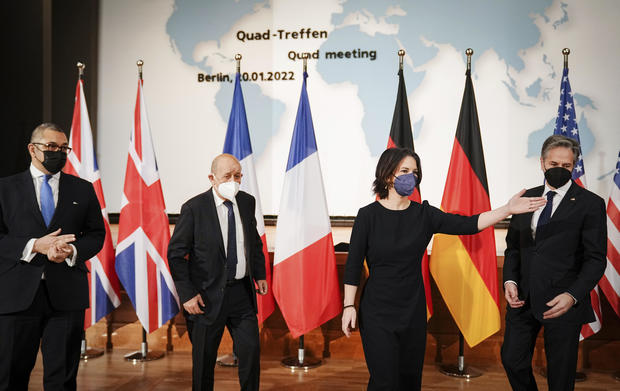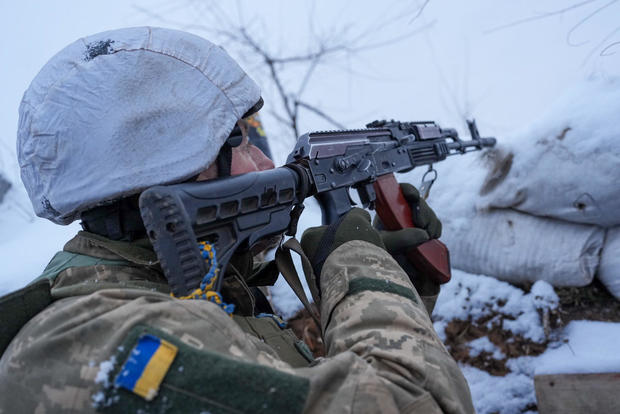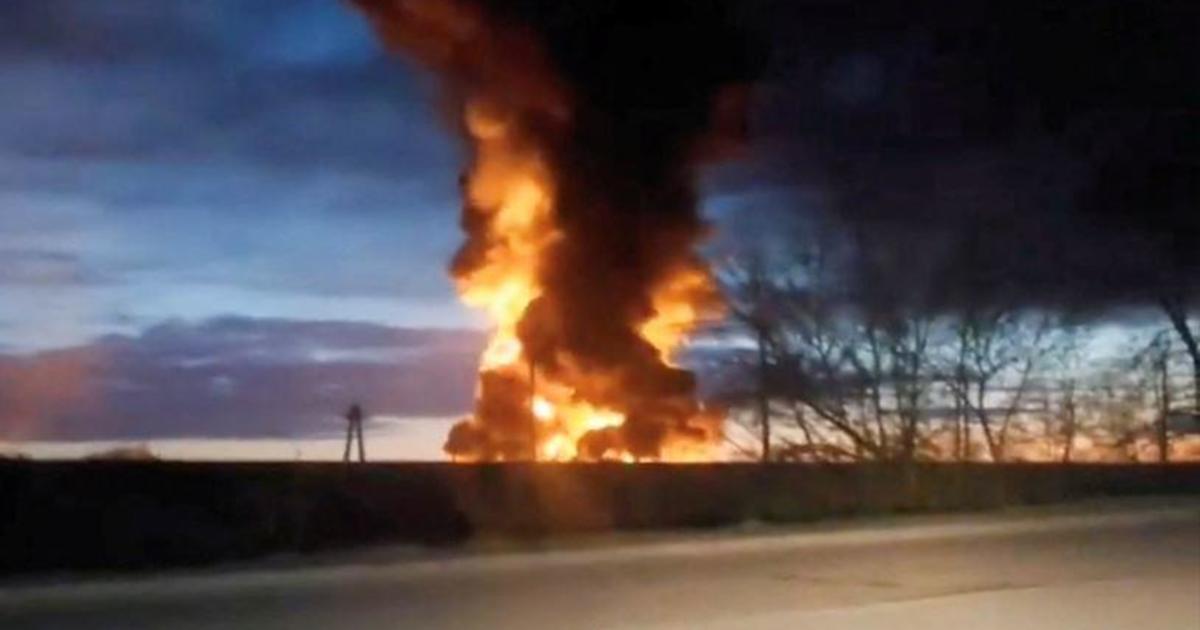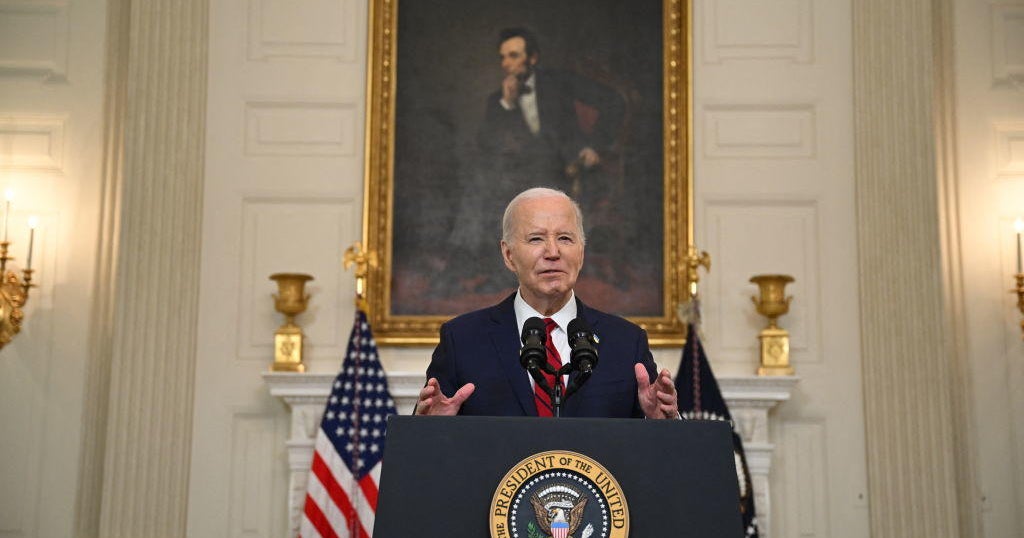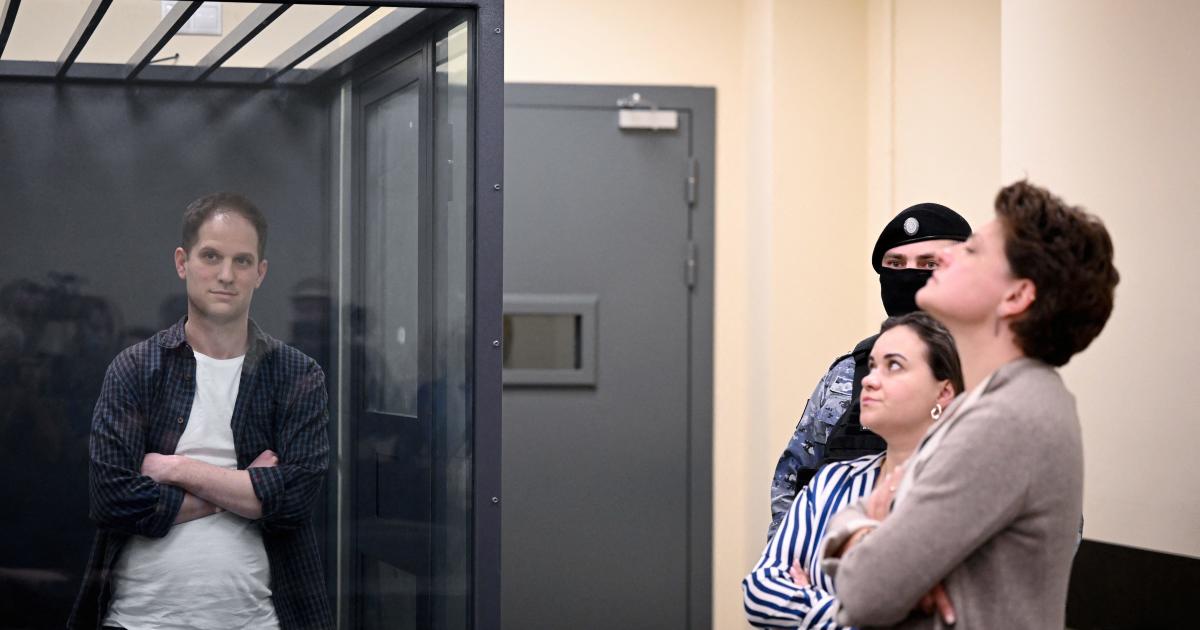As Biden predicts Russia will invade, U.S. rushes weapons into Ukraine with some — but not all — NATO allies
It was chilly in Geneva on Thursday morning, and there was no reason to think the talks between the top diplomats from the U.S. and Russia the following day would be any warmer. Tension between the two global powers continues to rise, with President Biden saying on Wednesday that it was his "guess" Russian President Vladimir Putin would use the roughly 100,000 forces he has massed along the border to "move in" to Ukraine.
"He has to do something," Mr. Biden said during a White House news conference, warning that if Putin did decide to invade his neighbor, Russia would suffer "consequential" loss of life. The president didn't elaborate on the level of military assistance the U.S. might offer Ukraine in the face of an invasion, but it came as his administration worked with NATO allies to bolster Ukraine's forces — and quickly.
U.S. weapons, Russian war games
U.S. officials confirmed to CBS News that the Biden administration had given permission to several NATO allies to send emergency shipments of U.S.-made weapons — including anti-tank missiles — to Ukraine to reinforce the country's defenses. State Department sources said allies including Estonia, Latvia, Lithuania and the U.K. were cleared to make "Third Party Transfers" of U.S.-made and supplied equipment to Ukraine, which one official described as part of a race "to get as much gear to the Ukrainians as quickly as possible."
Russia, meanwhile, was moving military hardware and troops into Belarus — a close Russian ally that borders not only Ukraine, but also Lithuania, Latvia and Poland — for military exercises set to take place in February. American officials have voiced concern that Russia could use its troop presence in Belarus as another route to stage an overt invasion of Ukraine, or a so-called "false-flag" operation to create a "pretext for invasion."
Russia's defense ministry also announced on Thursday that it would conduct naval exercises "in all areas of responsibility of its fleets," including the Mediterranean, the northern Arctic seas, the northeastern Atlantic and in the Pacific Ocean. The drills, to take place in January and February, will involve more than 140 ships, 60 aircraft and about 10,000 forces, the ministry said.
The ministry said the drills would cover regions of seas and oceans adjacent to Russian territory, as well as what the Russian military called "operationally important areas" of other bodies of water.
U.S. and allies on the "same page"?
Secretary of State Antony Blinken was in Germany on Thursday, where he met with allies who, by President Biden's own admission, are not all on the "same page" about the level of sanctions to impose on Russia should Putin choose to invade his neighbor again. Russian forces last openly invaded Ukraine in 2014, when Putin unilaterally annexed the Crimean Peninsula.
American officials have played down divisions within NATO over how much pressure to exert on Russia. The U.S. and Britain, for instance, have extended direct military aid to Ukraine, while Germany has declined to do so.
There was scant immediate reaction from EU capitals to President Biden's tough rhetoric on Thursday, but French President Emmanuel Macron said Europe should have its own negotiations with Russia and not rely on the U.S. to speak for it.
Asked about the divisions among allies, a senior State Department official insisted to CBS News on Thursday that there was "universal agreement on the steep costs" Russia must be forced to pay if it does invade, and the U.S. and its allies were "in the process of finalizing the mechanics" on how to ensure that could be done.
Blinken, asked on Thursday to clarify Mr. Biden's remarks from the previous day, when he indicated that any U.S. response to a Russian invasion may be adjusted depending on the scale of Russia's actions, said the administration had been "very clear throughout: If any Russian military forces move across the Ukrainian border and commit new acts of aggression against Ukraine, that will be met with a swift, severe response from the United States and our allies and partners."
After Blinken's meetings on Thursday with French, German and British officials in Berlin, the State Department said the diplomats had discussed "joint efforts to deter further Russian aggression against Ukraine, including Allies' and partners' readiness to impose massive consequences and severe economic costs on Russia for such actions."
Reading Russian minds
The biggest outstanding question, from the perspective of U.S. officials and their allies, had not changed as Blinken prepared for his Friday meeting with Russian Foreign Minister Sergey Lavrov: What does Putin really want?
Kremlin officials have insisted that Russia has no plans or intentions to invade Ukraine, and Putin and his top aides insist it is the U.S. and NATO fueling animosity by threatening sanctions and moving military hardware and personnel close to Russia's western borders. But Moscow also issues continual warnings of military action if Putin's demands are not met — chiefly his insistence that NATO reject Ukraine's bid for membership.
The Biden administration has called that demand a non-starter, but both sides have shown a willingness to at least keep talking, most notably with the Friday meeting between Blinken and Lavrov on the neutral ground in Geneva.
Despite President Biden's "guess" on Wednesday, American officials say they still don't know for certain if Putin has decided to launch an invasion of Ukraine, on any scale, or whether the brinkmanship is merely intended to extract concessions from the U.S. and NATO as Moscow seeks what it calls "security guarantees."
Mr. Biden said on Wednesday that he didn't believe Putin wanted a "full-blown war," but that he expected the Russian leader to test the U.S. and NATO's resolve as much as possible.
State Department officials have said they still don't know what Putin is thinking, but they're planning for all eventualities. A large part of Blinken's mission when he meets Lavrov on Friday will no doubt be to assess, to the extent possible, Moscow's intentions.
CBS News' Margaret Brennan in Washington and Mary Ilyushina in Moscow contributed to this report.
